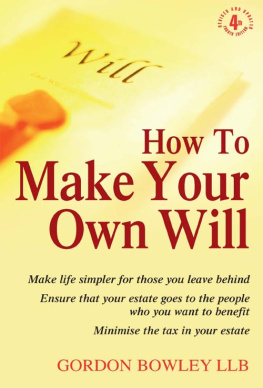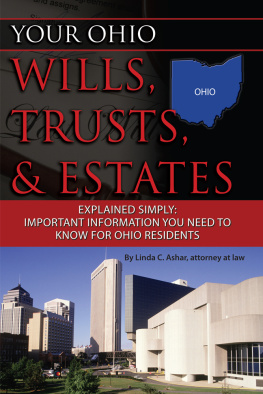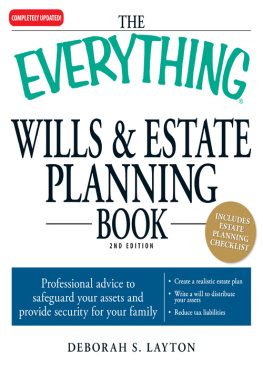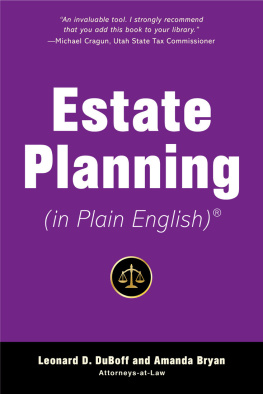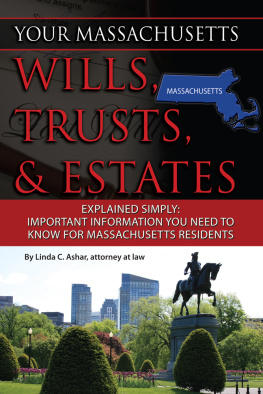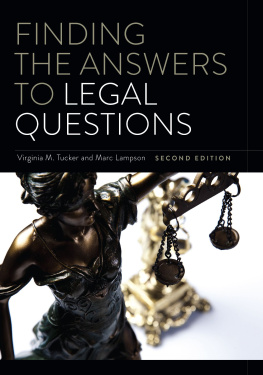How To
Make Your
Own Will
Visit our How To website at www.howto.co.uk
At www.howto.co.uk you can engage in conversation with our authors all of whom have been there and done that in their specialist fields. You can get access to special offers and additional content but most importantly you will be able to engage with, and become a part of, a wide and growing community of people just like yourself.
At www.howto.co.uk youll be able to talk and share tips with people who have similar interests and are facing similar challenges in their lives. People who, just like you, have the desire to change their lives for the better be it through moving to a new country, starting a new business, growing their own vegetables, or writing a novel.
At www.howto.co.uk youll find the support and encouragement you need to help make your aspirations a reality.
You can go direct to www.how-to-make-your-own-will.co.uk which is part of the main How To site.
How To Books strives to present authentic, inspiring, practical information in their books. Now, when you buy a title from How To Books, you get even more than just words on a page.
How To
Make Your
Own Will
GORDON BOWLEY LLB
how to books
Lets choose executors and talk of wills.
Richard II, Act III, Scene II William Shakespeare.
Published by How To Books Ltd,
Spring Hill House, Spring Hill Road,
Begbroke, Oxford OX5 1RX, United Kingdom
Tel: (01865) 375794. Fax: (01865) 379162.
www.howtobooks.co.uk
All rights reserved. No part of this work may be reproduced or stored in an information retrieval system (other than for purposes of review) without the express permission of the publisher in writing.
The right of Gordon Bowley to be identified as author of this work has been asserted by him in accordance with the Copyright, Designs and Patents Act 1988.
2009 Gordon Bowley
First published 2003
Second edition 2005
Third edition 2007
Fourth edition 2009
ISBN: 978 1 84528 379 7
ePub ISBN: 978 1 84803 653 6
Mobi ISBN: 978 1 78102 195 8
British Library Cataloguing in Publication Data
A catalogue record for this book is available from the British Library
Ebook produced for How To Books by ePubDirect.com
NOTE: The material contained in this book is set out in good faith for general guidance and no liability can be accepted for loss or expense incurred as a result of relying in particular circumstances on statements made in this book and the book is bought and sold on that basis. Laws and regulations are complex and liable to change, and readers should check the current position with the relevant authorities before making personal arrangements.
Preface to the fourth edition
This book was originally written to assist you, whether you wish to prepare your own will or to use a professional to make one for you and the fourth edition has the same aim.
This edition thoroughly updates the third edition to take account of changes in statutory and case law. The changes to inheritance tax and consequences for tax planning brought about by the introduction of the transferable nil-rate inheritance tax band (which is discussed in detail) have been noted and the subject of inheritance is now treated in two chapters, one dealing with the subject in general and the other with reducing liability to the tax.
The book takes a logical step-by step approach to its subject and I hope and believe that it will alert you to the many and broad ranging matters to be considered when you take the important step and have your last say.
I have tried to deal not only with the formal, factual legal requirements and technicalities of making a will and to supply examples of wills which can be easily adapted to meet individual circumstances, but also to incorporate something of what I gained from the experience of making and proving thousands of wills in over 30 years practising as a family solicitor. I have endeavoured to set out the things a solicitor would tell you if you could afford to pay for the time it would take!
Throughout the book I have tried to use as few legal terms as conveniently possible and I have included a glossary to help you to understand those that have been used. The appendix contains examples of various forms referred to in the book, a checklist and specimen wills with notes as to how they may be adapted to individual circumstances and additional clauses for use in less common situations.
The book only deals with the law applicable to England and Wales. Scottish law is different. Moreover, law and practice change frequently and personal circumstances vary considerably. For these reasons, while every effort has been made to ensure that the contents of the book are accurate and up to date, no responsibility is accepted for any loss resulting from acting, or from failure to act, as a result of it and the book is sold and bought on that basis. In particular, changes which might be made to the inheritance tax nil-rate exemption band or tax rates in future Finance Acts, should be borne in mind.
Throughout the book, for simplicitys sake and not for any reasons of gender prejudice, I have assumed that the usual case of the male of the species predeceasing the female will occur and throughout the book, he should be read as she or they where the context and circumstances require.
Crown copyright is acknowledged in respect of all statutory or governmental material quoted in the text.
I hope that you will find the book useful.
Gordon Bowley

Why Should You Make a Will?
IT IS YOUR MONEY AND YOU WANT TO DECIDE WHO SHALL HAVE IT
It is self-evident that after death you can no longer personally manage, control or direct the destination of the assets you have so painstakingly acquired during your life or who is to benefit from what remains of them. Neither is it possible for you personally to have any direct input in the upbringing of your children.
If on death, which comes to us all and sometimes when we least expect it, you leave a valid will, it is possible at least indirectly to influence such matters. If you leave no valid will you are said to die intestate and these matters are decided in the main by the state, which is what few would wish and which sometimes has disastrous consequences. By making a will you will have more control over these and other matters and the flexibility which a will gives will bring peace of mind as to what will happen after your death.
The laws of intestacy do not rank highly on the political agenda and were mostly enacted in 1925. Only occasional and piecemeal revisions have been made since that date. The result is that they are out of date and unsuitable for British society in the twentyfirst century in which marriage to a lifetime partner is no longer the norm.
In brief, in the case of death without a valid will, who inherits and deals with the winding up of what you leave (known as your estate) depends upon the size of your estate and what relatives, if any, survive you, and these are both matters of chance. If no relatives within a prescribed degree survive you, the Crown or the Duchies of Lancaster or Cornwall will inherit and wind up your estate, which is something that most people would wish to avoid. Moreover, it is more likely that it will be possible to trace those entitled under your will than to trace perhaps long-lost relatives entitled under the laws of intestacy.
Other problems can arise if you do not leave a valid will:

